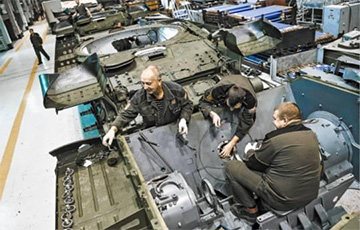Russian Defense Plants Face Record Shortage Of Qualified Personnel
26- 18.01.2023, 19:07
- 27,008

The shortage of personnel will only intensify.
Enterprises of the military-industrial complex of Russia, which have been transferred to an enhanced mode of operation due to the war in Ukraine, are experiencing a shortage of qualified personnel. The losses caused by the mobilization, as well as the mass exodus of citizens abroad, aggravated the situation, Vedomosti writes in its forecast for 2023.
Experts note that the shortage of personnel in the “rapidly growing” military-industrial sector will only intensify. In 2023, the military-industrial complex will lack about 50 thousand specialists: first of all, we are talking about highly qualified engineers of a very specific profile — the military industry can respond to their lack by a significant slowdown in growth, says Alexander Safonov, professor at the Department of Personnel Management and Psychology, Vice-Rector of the Financial University under the Government of the Russian Federation.
At the end of December, President Vladimir Putin again demanded to provide the army with “all the necessary weapons, equipment, ammunition in a short time”. At the same time, factories should work on improving the arsenal and “significantly improve” its characteristics “taking into account the combat experience gained”, the supreme commander noted.
In the meantime, factories are already working “practically around the clock,” said the head of Rostec, Sergei Chemezov, in early January. In the summer, the government passed a draft law on special powers through the State Duma, which made it possible to transfer defense enterprises to work in three shifts without days off and holidays, and also to oblige businesses to fulfill state orders in the interests of the army and special services without the right to refuse. According to Chemezov, a “round-the-clock” schedule has been set at the country's largest tank plant, Uralvagonzavod, at the High-Precision Complexes enterprise, which produces rocket and artillery installations, including Iskander-M, Pantsir S-1, and Igla-S, as well as in the United Aircraft Corporation, the United Engine Corporation and Russian Helicopters.
By the end of 2022, the shortage of personnel in the domestic industry reached record levels for 30 years, as follows from a survey conducted by the Gaidar Institute for Economic Policy. Specifically, at engineering enterprises, the labor sufficiency index fell to minus 35%.
According to the Ministry of Labor, the defense industry lacks 3,814 people, however, according to the secretary of the Federation of Independent Trade Unions of Russia Oleg Sokolov, in fact, the figure is much higher and amounts to 20,000 people. By the end of October, the shortage of personnel in the Nizhny Novgorod defense industry alone reached 10-12 thousand employees, said Andrei Sanosyan, deputy governor of the region.
“Indeed, there is a shortage of personnel, primarily skilled workers — locksmiths, turners, machine operators, there is a certain shortage of IT specialists,” a source in Rostec confirmed. Enterprises working for the Navy lack pipeliners, solderers, welders, and ship assemblers.”
According to the Deputy CEO for Personnel Development of PJSC “KMZ named after Zverev” Alexei Atlanov, the state does not yet have a “clear strategy” for training specialists. With the outbreak of the war, “we realized that there were personnel problems that could not be extensively solved with any available resources. Even if now we raise salaries to 150,000, to 200,000, we will still experience a shortage of specialists with the necessary qualifications. In the 1990s and early 2000s, no one prepared them. It's good that things are changing now. But three years must pass to see the result,” he said.
According to a survey of major companies conducted in October by the Russian Union of Industrialists and Entrepreneurs, 60% of employers expect the shortage of personnel to worsen due to the impact of mobilization on the labor market. As of the end of October, more than 300,000 people were drafted into the army, and in December, Defense Minister Sergei Shoigu announced his intention to replenish it with another 350,000. It also became known about the secret preparation of the country for the second wave of mobilization. At the same time, in the first wave, in September alone, the Russian economy lost 600,000 workers, the Ministry of Economic Development calculated.
The conscription of hundreds of thousands of people into the army and the mass exodus abroad, along with the direct victims of the conflict, will reduce the already small cohort of Russian citizens at their peak of working age, said Natalya Zubarevich, professor at Moscow State University. “The main problem is not the loss of workers, but the brain drain,” she says. “People who leave tend to be better off and better educated. You can't run away with an empty wallet.”










